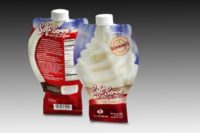Fluid milk processing facilities are generally the same. They all have rooms for milk intake, separating, homogenizing and filling. Broadacre Dairy has one building on the edge of its property that makes it unique among dairy processors: a log cabin where the owner was born.
William B. Weigel, chairman and chief executive officer of Weigel’s, was born in 1938 in that cabin, which stands on the edge of the dairy in Powell, Tenn. In 1918, Weigel’s grandfather bought 600 acres and began a truck farm. In 1931, his sons William W. Weigel, Jr. and Lynn B. Weigel bought four cows and became dairy farmers. In 1936, Broadacre was one of the first dairies in eastern Tennessee to distribute pasteurized milk.
Bill Weigel’s father, William Jr., and his uncle, Lynn B. Weigel, studied dairy science at the University of Tennessee. In 1938, they assumed operation of the dairy farm, with William in charge of marketing and farm operations and Lynn heading dairy processing. (Lynn died in 2011 at age 94.) After Bill Weigel’s father died in 1974, the dairy herd was sold and much of the acreage was subdivided for housing. But the log cabin remains and is inhabited by tenants.
In the 1960s, Bill Weigel began developing a chain of convenience stores (see related article on page 44). Broadacre Dairy processes dairy and nondairy beverages sold under the Weigel’s label. Four days a week, the production team bottles white and chocolate milk, buttermilk, juices, teas and fruit drinks, which are distributed exclusively in the 60-some Weigel’s convenience stores located in and around Knoxville. The stores also carry single-serve chocolate milk from Nestle and branded coffee and juice beverages from other processors.
Weigel’s Skim D’Lite is popular with customers. The cold bowl separating process is the reason, Weigel says. The process, performed at about 35 to 40 degrees is said to give the milk better body and flavor. Traditional separating is done at 145 degrees, and can impart a cooked flavor to milk. Broadacre is one of the few dairies that uses cold bowl separation. (Mega-processors want to extract every bit of fat possible.)
Broadacre accepts three tankers of milk every other morning from eastern Tennessee dairy farmers who belong to Dairy Farmers of America. They pledge not to use artificial growth hormones in their herds. At the receiving bay, milk flows through newly installed flow meters that help the processor track yields and shrinkage. There is a 25,000-gallon raw storage silo and a 16,000-gallon silo.
The separating, homogenizing and pasteurizing processes begin at midnight so filling can begin in the morning. Broadacre uses the high temperature/short time pasteurizing process. There are three pasteurized tanks: a 6,000-gallon tank for vitamin D whole milk; an 8,000-gallon tank for 2% milk; and a 15,000-gallon tank for skim milk. (Excess cream is sold to nearby Mayfield Dairy for its ice cream.)
Bottling milk and teas
The filling line can handle pint, quart, half-gallon and gallon formats. To cut down on filling line changes, the dairy staggers production. On Mondays and Fridays, it processes white milk in pints and quarts and chocolate milk in all formats. White milk in other formats is processed on Wednesdays, and nondairy beverages on Tuesdays. Thursday is a cleaning day. Pint and quart bottles are made of PET plastic and the signature bright yellow gallons are high-density plastic. (In the early years, Weigel’s sold milk in returnable glass bottles which were later replaced by returnable Lexan containers.)







